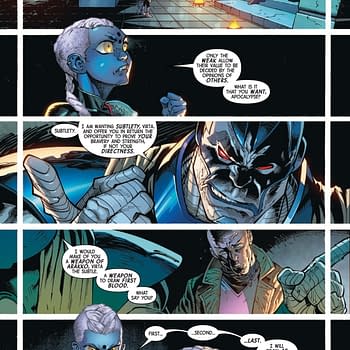Posted in: Look! It Moves! by Adi Tantimedh, Movies | Tagged: comic book, entertainment, female, movie
The Summer Of The Female Comic Book Movie – Look! It Moves! By Adi Tantimedh
Adi Tantimedh writes,
While thousands of words are being written on comic book movies this summer, including the impending decline of the superhero movie, there's a trend that no one has picked up on: the rise of the female comic book movie.
[youtube]https://www.youtube.com/watch?v=65UUtHBHJZM[/youtube]
Right now, a comic book movie is the biggest hit in China. Go Away Mr. Tumor is an Almodovar-like romantic comedy adapted from an autobiographical comic by Xiong Dun that went viral and attracted millions of fans online. It's a pop-inflected comedic take on the heroine's battle with cancer while continuing to hang out with her friends, exploring their hopes, dreams, fantasies and identities in a 21st Century China of disposable income, designer fashions and social media. She decides to live her life to the fullest and turns it into a madcap comedy before the inevitable fade-out.
This is not even the first movie from China to explore the desires and preoccupations of modern Chinese woman with their increased eoncomic and social power. Tsui Hark's All About Women and the Tiny Times movies, among many others, have done that. It's about fashion, glamour, friendship and social media. Go Away Mr. Tumor is a next step in that it uses its heroine's terminal illness to examine the hopes and desires of modern Chinese woman – and by extension Chinese people – with a bit more depth under the sugar coating of CGI cartoon setpieces and slapstick comedy. These movies present a modern (mostly urban) China that's hip, glamourous and progressive. It's how they would like to see themselves.
Go Away Mr. Tumor is already beating out the FX-driven action comedy Monster Hunter, which is also based on a comic and, funnily enough, stars the same leading actress Bai Bai He. This is the first time a star's new movie has beaten out her other new movie. It's currently playing in major cities in the US at AMC Cineplexes.
[youtube]https://www.youtube.com/watch?v=NvR4kSe2Haw[/youtube]
The Japanese entry in the competition at the Cannes Film Festival this year was another comic adaptation, Our Little Sister, from the manga Umimachi Diary (translation: "Seaside Town Diary") by Akimi Yoshida. It's a quiet, smoldering character drama about three adult sisters who meet their teenage half-sister at their father's funeral and, defying convention and the prejudices of their family, invite her to live with them to form a new family unit. Directed by Hirokazu Koreeda, one of the few Japanese directors in the last 20 years to be acclaimed as an international arthouse director for his quiet, acutely-observed social dramas and considered heir to the mantle of past masters like Ozu. It's very Japanese in the way it depicts the emotional shifts underneath stoical and reserved surfaces that threaten to erupt as the sisters' contrasting personalities and their conflicts with each other and the rest of the family roll on while they struggle make a space for their new sister, trying to heal themselves as they help her in their collective grief. Sony Pictures has picked up the rights to release it in the US.
[youtube]https://www.youtube.com/watch?v=M9LNsSjnqBM[/youtube]
And the US hasn't been left out. This summer also saw the release of Diary of a Teenage Girl, adapted from Phoebe Gloecker's graphic novel from the 2002, here an unflinching and unsentimental comedy about a teenage girl's coming of age and very messy sexual awakening. More than just a teen comedy, it delves deeper into the complications and complexities of its heroine's inner life and sexuality more than any other movie has before, refusing to paint her as a victim, which makes it one of the more progressive feminist movies of the year.
All three movies opened this summer and have gotten critical acclaim. They differ from the usual Boy's Own Superhero movies by concentrating on female emotional experiences and relationships rather than fighting supervillains or blowing up cities, and their primary audience is of course female, the stories emphasising emotional connection and empathy. For all the hype and bluster over superhero movies – and they need all the hype and column inches they can get to get the maximum amount of eyeballs and money – it's notable that these three movies from comics by female creators managed to come out and achieve success quietly. That Go Away Mr. Tumor is on its way to becoming a megahit in China just goes to prove the commercial viability of a female audience in much the same way female readers are now dominating the book market and essentially keeping it alive. Hollywood may fret and deny the need to make more movies for women, the Chinese and Asian markets have already cottoned onto the strength of appealing to that audience. All this at the same time that the comics industry in the US is finally realising the importance and growth of the female readership. These three movies also disprove the stereotype of comic book movies as infantile superhero stories. There will always be blockbusters for boys, but Go Away Mr Tumor is a sign that the blockbuster for girls is here too.
This is the future. The future is female.
Go away, Mr. Boredom at lookitmoves@gmail.com
Follow the official LOOK! IT MOVES! twitter feed at http://twitter.com/lookitmoves for thoughts and snark on media and pop culture, stuff for future columns and stuff I may never spend a whole column writing about.
Look! It Moves! © Adisakdi Tantimedh


















